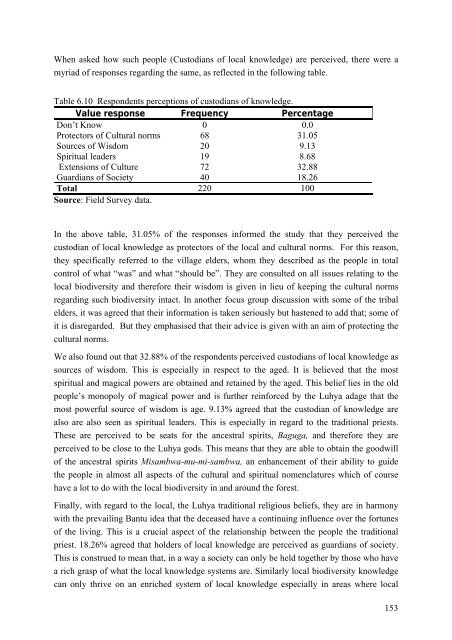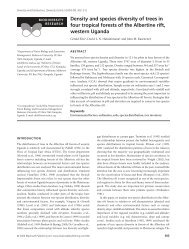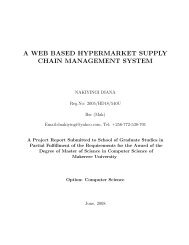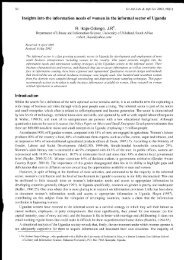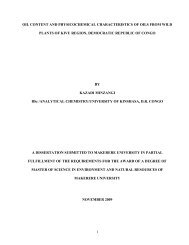THE UNIVERSITY OF LEIPZIG
THE UNIVERSITY OF LEIPZIG
THE UNIVERSITY OF LEIPZIG
Create successful ePaper yourself
Turn your PDF publications into a flip-book with our unique Google optimized e-Paper software.
When asked how such people (Custodians of local knowledge) are perceived, there were a<br />
myriad of responses regarding the same, as reflected in the following table.<br />
Table 6.10 Respondents perceptions of custodians of knowledge.<br />
Value response Frequency Percentage<br />
Don’t Know 0 0.0<br />
Protectors of Cultural norms 68 31.05<br />
Sources of Wisdom 20 9.13<br />
Spiritual leaders 19 8.68<br />
Extensions of Culture 72 32.88<br />
Guardians of Society 40 18.26<br />
Total 220 100<br />
Source: Field Survey data.<br />
In the above table, 31.05% of the responses informed the study that they perceived the<br />
custodian of local knowledge as protectors of the local and cultural norms. For this reason,<br />
they specifically referred to the village elders, whom they described as the people in total<br />
control of what “was” and what “should be”. They are consulted on all issues relating to the<br />
local biodiversity and therefore their wisdom is given in lieu of keeping the cultural norms<br />
regarding such biodiversity intact. In another focus group discussion with some of the tribal<br />
elders, it was agreed that their information is taken seriously but hastened to add that; some of<br />
it is disregarded. But they emphasised that their advice is given with an aim of protecting the<br />
cultural norms.<br />
We also found out that 32.88% of the respondents perceived custodians of local knowledge as<br />
sources of wisdom. This is especially in respect to the aged. It is believed that the most<br />
spiritual and magical powers are obtained and retained by the aged. This belief lies in the old<br />
people’s monopoly of magical power and is further reinforced by the Luhya adage that the<br />
most powerful source of wisdom is age. 9.13% agreed that the custodian of knowledge are<br />
also are also seen as spiritual leaders. This is especially in regard to the traditional priests.<br />
These are perceived to be seats for the ancestral spirits, Baguga, and therefore they are<br />
perceived to be close to the Luhya gods. This means that they are able to obtain the goodwill<br />
of the ancestral spirits Misambwa-mu-mi-sambwa, an enhancement of their ability to guide<br />
the people in almost all aspects of the cultural and spiritual nomenclatures which of course<br />
have a lot to do with the local biodiversity in and around the forest.<br />
Finally, with regard to the local, the Luhya traditional religious beliefs, they are in harmony<br />
with the prevailing Bantu idea that the deceased have a continuing influence over the fortunes<br />
of the living. This is a crucial aspect of the relationship between the people the traditional<br />
priest. 18.26% agreed that holders of local knowledge are perceived as guardians of society.<br />
This is construed to mean that, in a way a society can only be held together by those who have<br />
a rich grasp of what the local knowledge systems are. Similarly local biodiversity knowledge<br />
can only thrive on an enriched system of local knowledge especially in areas where local<br />
153


